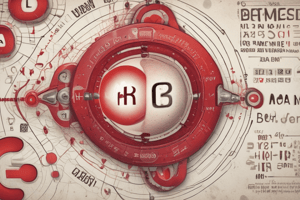Podcast
Questions and Answers
What determines a person's blood group in the ABO system?
What determines a person's blood group in the ABO system?
A person's blood group is determined by the presence or absence of antigens A and B on the surface of red blood cells.
What are agglutinogens and why are they significant?
What are agglutinogens and why are they significant?
Agglutinogens are antigenic substances on red blood cells that can cause agglutination when mismatched blood is transfused, leading to potentially fatal reactions.
What type of antibodies do individuals with blood group O have?
What type of antibodies do individuals with blood group O have?
Individuals with blood group O have both anti-A and anti-B antibodies in their plasma.
Which blood group can receive blood from any donor and why?
Which blood group can receive blood from any donor and why?
How do antibodies relate to the antigens a person's blood group lacks?
How do antibodies relate to the antigens a person's blood group lacks?
What are the potential outcomes of a transfusion mismatch?
What are the potential outcomes of a transfusion mismatch?
What blood groups can a person with blood group A donate to?
What blood groups can a person with blood group A donate to?
Explain why blood group B individuals cannot receive blood from group A.
Explain why blood group B individuals cannot receive blood from group A.
Which blood groups can a person with blood group B receive?
Which blood groups can a person with blood group B receive?
Why are people with blood group AB called universal recipients?
Why are people with blood group AB called universal recipients?
What antibodies does a person with blood group O have?
What antibodies does a person with blood group O have?
What happens if a Rh- mother has antibodies against Rh+ blood during pregnancy?
What happens if a Rh- mother has antibodies against Rh+ blood during pregnancy?
What characterizes the Rh+ blood group?
What characterizes the Rh+ blood group?
What is the consequence of a blood transfusion reaction?
What is the consequence of a blood transfusion reaction?
How does a person become sensitized to Rh+ blood?
How does a person become sensitized to Rh+ blood?
What role does serum containing anti-Rh+ antibodies play for Rh- mothers?
What role does serum containing anti-Rh+ antibodies play for Rh- mothers?
Flashcards
Blood Group Antigens
Blood Group Antigens
Specific markers on the surface of red blood cells that help the body distinguish its own cells from foreign ones.
Agglutination
Agglutination
The clumping of red blood cells due to the presence of antibodies reacting with antigens on the cell surface.
Blood Group System
Blood Group System
A classification system that categorizes blood based on the presence or absence of specific antigens.
ABO Blood Group System
ABO Blood Group System
Signup and view all the flashcards
Antibody
Antibody
Signup and view all the flashcards
Blood Compatibility
Blood Compatibility
Signup and view all the flashcards
Blood Group A
Blood Group A
Signup and view all the flashcards
Blood Group B
Blood Group B
Signup and view all the flashcards
Blood Group AB
Blood Group AB
Signup and view all the flashcards
Blood Group O
Blood Group O
Signup and view all the flashcards
Rh Factor
Rh Factor
Signup and view all the flashcards
Rh+
Rh+
Signup and view all the flashcards
Rh-
Rh-
Signup and view all the flashcards
Rh Sensitization
Rh Sensitization
Signup and view all the flashcards
Hemolytic Disease of the Newborn
Hemolytic Disease of the Newborn
Signup and view all the flashcards
Blood Transfusion Reaction
Blood Transfusion Reaction
Signup and view all the flashcards
Study Notes
Overview of Blood Groups
- Blood groups are determined by specific antigens on red blood cell membranes.
- Antigens enable the body to identify whether cells are self or foreign, leading to potential agglutination (clumping).
- Over 30 blood groups exist, but the ABO and Rh systems are the most clinically significant.
ABO Blood Group System
-
Key Antigens and Groups:
- Blood group A has antigen A and anti-B antibodies.
- Blood group B has antigen B and anti-A antibodies.
- Blood group AB has both antigens A and B; no antibodies present.
- Blood group O has no antigens and both anti-A and anti-B antibodies.
-
Compatibility:
- Group A can donate to A and AB; receives from A and O.
- Group B can donate to B and AB; receives from B and O.
- Group AB is a universal recipient, receiving from all groups (A, B, AB, O).
- Group O is a universal donor, donating to all groups (A, B, AB, O).
Antibodies and Blood Transfusion
- The body produces antibodies against AB antigens not possessed.
- A person with blood group A has antibodies against antigen B, making B and AB blood types foreign.
- Similar logic applies to blood group B against antigen A.
- Blood group O, having antibodies against both A and B, cannot receive blood from A or B.
Rh Blood Group System
- Based on presence of D antigen; Rh+ has D, Rh- lacks D.
- Blood groups with Rh factor: A+ (A and D), A- (A only).
- Rh antibodies are usually formed after exposure to Rh antigens (e.g., through transfusions).
Clinical Implications of Rh Factor
- Rh- individuals will not initially react to Rh+ blood but will produce antibodies upon second exposure.
- Rh- mothers with antibodies against Rh+ may experience complications during pregnancy, potentially leading to hemolytic disease of the newborn.
- Prevention methods include administering anti-Rh+ serum to Rh- mothers to avoid sensitization.
Blood Transfusion Reactions
- Mismatched transfusions can trigger immune responses, leading to hemolysis (destruction of red blood cells).
- Transfusion reactions result in clumping, clogging of vessels, and release of hemoglobin in bloodstream.
- Complications may include renal failure and can be fatal.
Studying That Suits You
Use AI to generate personalized quizzes and flashcards to suit your learning preferences.



